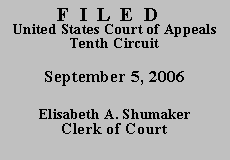

| JOHNNY D. WADKINS,
v.
AL ESTEP; JOHN W. SUTHERS,
Attorney General of the State of
Colorado |
|
AND DISMISSING APPLICATION
Before HENRY, BRISCOE, and O'BRIEN,
Circuit Judges.
After examining the briefs and appellate record, this panel has determined
unanimously that oral argument would not materially assist the determination of
this appeal. See Fed. R. App. P. 34(a)(2); 10th Cir. R. 34.1(G). The case is
therefore ordered submitted without oral argument.
Johnny D. Wadkins, a state prisoner proceeding pro se,(1) filed a petition for writ of habeas corpus pursuant to 28 U.S.C. § 2254. Wadkins was convicted of theft following a jury trial and sentenced as a habitual criminal to life in prison. After pursuing a direct appeal and state post-conviction relief, Wadkins sought relief in federal district court. Wadkins raised nine claims in his petition.(2)
The magistrate judge to whom the matter was referred recommended the application be denied. The district court adopted the recommendation, denied Wadkins' application for writ of habeas corpus, and dismissed the case with prejudice. Wadkins then filed a notice of appeal and a motion for leave to proceed on appeal in forma pauperis (ifp). The district court denied a certificate of appealability (COA), finding Wadkins had not made a substantial showing of the denial of a constitutional right. The court also denied the motion to proceed ifp pursuant to Federal Rule of Appellate Procedure 24(a)(3), finding the appeal was not taken in good faith because Wadkins had not "shown the existence of a reasoned, nonfrivolous argument on the law and facts in support of the issues raised on appeal." (R. Doc. 37 at 1.) Wadkins has filed with this Court an application for a COA and for leave to proceed ifp. See 28 U.S.C. § 2253(c)(1)(A); Fed. R. App. P. 22(b)(1), 24(a)(5). We DENY both Wadkins' application for a COA and his motion for leave to proceed ifp.
The magistrate judge meticulously reviewed each of Wadkins' claims, setting forth the factual and procedural basis for each, discussing the resolution of each issue in the state courts, and analyzing controlling law. The magistrate judge concluded Wadkins was not entitled to relief under § 2254 and recommended the application be denied, and the case be dismissed with prejudice. The district court reviewed the entire record and Wadkins' objections to the recommendation, then adopted the recommendation and dismissed the matter. We need not replicate the thorough analysis; the district court's order of dismissal is not reasonably debatable. Slack, 529 U.S. at 484. Wadkins has failed to make a sufficient showing he is entitled to a COA. Accordingly we DISMISS his application.
A prisoner seeking leave from this Court to proceed ifp must show "a financial inability to pay the required fees, and the existence of a reasoned, nonfrivolous argument on the law and facts in support of the issues raised on appeal." McIntosh v. U.S. Parole Comm'n, 115 F.3d 809, 812 (10th Cir. 1997) (citation omitted); DeBardeleben v. Quinlan, 937 F.2d 502, 505 (10th Cir. 1991). In denying Wadkin's motion to proceed ifp on appeal, the district court found he had not met his burden and held the appeal was not taken in good faith, pursuant to Rule 24(a)(3). After reviewing Wadkins' contentions and giving weight to the district court's decision, we adopt the district court's finding. See Coppedge v. United States, 369 U.S. 438, 446 (1962). We DENY Wadkins' motion to proceed ifp and order him to remit the full amount of the filing fee within twenty days. We remind him of his obligation to pay the filing fee on an appeal that has been dismissed. See Kinnell v. Graves, 265 F.3d 1125, 1129 (10th Cir. 2001) (dismissal of an appeal does not relieve appellant of the obligation to pay the filing fee in full).
Entered by the Court:
Terrence L. O'Brien
United States Circuit Judge
1. We construe pro se pleadings liberally. Ledbetter v. City of Topeka, Kan., 318 F.3d 1183, 1187 (10th Cir. 2003).
2. Claim One - due process violation based on incorrect insanity instructions; Claim Two - unknowing and unintelligent waiver of right to testify; Claim Three - due process violation when emergency room physician was allowed to give an opinion on Wadkins' sanity; Claim Four - insufficient evidence to support charge of possession of a weapon; Claim Five - erroneous instructions regarding prior felony convictions; Claim Six - court erred in not allowing Wadkins to challenge constitutionality of prior convictions; Claims Seven through Nine - ineffective assistance of counsel.